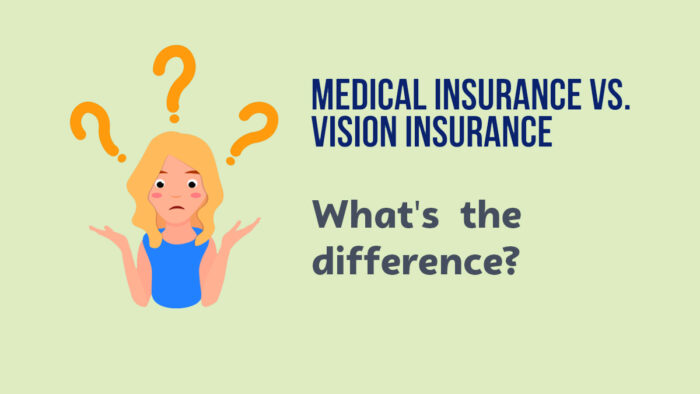Having medical and vision insurance is a good way to help with your eye care payments. While these insurance policies are good, they are different from each other. Medical and vision insurance may be similar to each other and cover your eye care treatments, but they do not work the same way.

It is important to understand the differences so you can choose the best insurance coverage for your eye care. Generally, everyone is familiar with the benefits of medical insurance, but most people find additional value in getting a vision insurance policy.
It can be very tricky to differentiate between these two insurance policies, mostly because vision insurance is often used as an addition to health insurance.
To help you understand the differences between these two policies, this write-up contains all the information you need to know about the differences between medical and vision insurance.
What is Medical Insurance?
Medical insurance is a type of insurance that offers financial help for different medical costs. It offers coverage for different things like treatments, tests, doctor visits, and procedures. If you have medical insurance, you will have to make a monthly payment for premiums to your insurance company.
In return, your insurance company will cover your medical expenses if you get diagnosed with or injured by a medical condition.
Medical insurance also covers eye care treatments along with expenses related to them. Having medical insurance can lessen the financial stress of paying medical expenses and make getting health care much easier when you need it.
What Does Medical Insurance Cover?
Generally, medical insurance, also known as health insurance, covers eye-related issues diagnosed by an optometrist during an eye exam. Some of the eye care-related expenses it covers include:
- Blurry vision not related to your prescription
- Eye Infections
- An Eye Emergency (Retinal Detachment, Eye Injury)
- Eye Allergies
- Eye Strain
- Dryness and irritation
- Eye diseases (glaucoma, cataracts, and macular degeneration)
- Dry Eyes
- Diabetic eye disease
These eye care treatments are covered under your medical insurance policy. Your medical insurance will cover the cost of an eye exam, even if you have a vision insurance policy in place.
What is Vision Insurance?
Vision insurance is a type of insurance that offers coverage for eye care and eyewear costs. It also covers the cost of routine eye exams, glasses, and contact lenses.
Just like medical insurance, you will be required to make a monthly payment for the premium to your vision insurance company.
In return, your vision insurance company will cover the cost of your routine vision expenses. Before selecting a vision insurance plan, it is important to understand what your insurance covers, its exclusions, and how much it costs.
Also, vision insurance covers routine eye exams, so you do not need to worry about your eye care expenses.
What Does Vision Insurance Cover?
Vision insurance covers part of the payment of basic preventive care like contact eye exams and vision tests, contact lenses, eyeglass frames, eyeglass lenses, and lens protection glasses.
Vision insurance offers additional coverage, like discounts on corrective eye surgery and disposable contact lens coverage.
However, this is just what vision insurance generally covers; to know what your policy covers, you need to check with your insurer or your policy.
Medical vs. Vision Insurance: What is the Difference?
To differentiate between medical insurance and vision insurance, you need to consider the type of eye exam you will undergo and why you are visiting the eye clinic. Your visits to an eye doctor are generally classified as medical or routine.
A routine vision exam may consist of the same elements as a medical eye exam. Also, the type of eye doctor you see for your exam does not affect the type of insurance coverage you need.
Vision insurance is designed to particularly help with the expenses of routine eye care and eyewear like contacts and glasses. It does not cover eye surgery, which is needed by everyone at a certain age. This insurance may not cover treatment for other medical issues relating to your eye care.
Eye problems may be due to medical conditions that require treatments. Medical insurance covers treatments like eye surgeries and other treatments.
Vision insurance only covers eye exams, while medical insurance covers eye treatments and other medical issues diagnosed by an eye doctor. To ensure you have full eye care insurance coverage, getting medical insurance coverage is a good idea.



